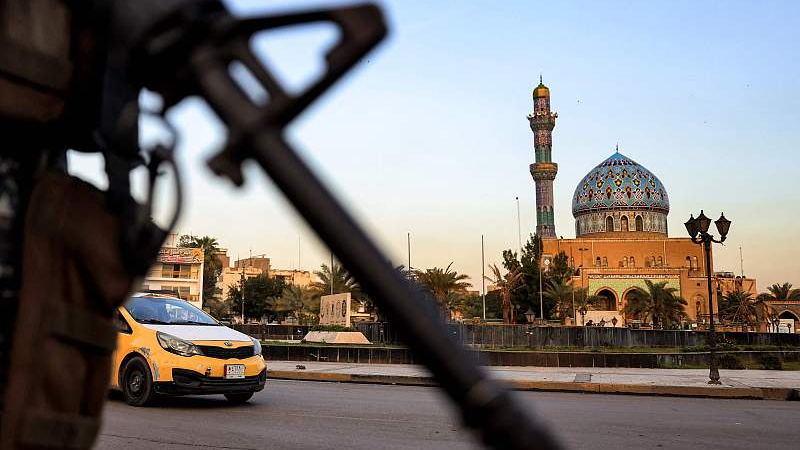
The muzzle of an assault rifle carried by a member of the Iraqi Federal Police standing guard appears near the 17 Ramadan Mosque along al-Firdous square in Baghdad, Iraq, March 9, 2023. (Photo: CFP)
Editor's note: Anthony Moretti is an associate professor at the Department of Communication and Organizational Leadership at Robert Morris University.
Twenty years ago – March 20, 2003 – the U.S. military stormed into Iraq with superior forces and better equipment and faced little resistance from the Iraqi military, which demonstrated a lack of loyalty to Saddam Hussein. Victory seemed certain, and immediate.
Supporting that U.S.-led military invasion was a bed of lies, the most egregious was the contention that Iraq was littered with weapons of mass destruction (WMD). On February 5, 2003, former U.S. Secretary of State Colin Powell made the case to the United Nations that Saddam was harboring WMDs and that the U.S. was prepared to lead a global alliance to unearth those weapons and remove Saddam from power.
Powell said, "The facts and Iraqis' behavior, Iraq's behavior, demonstrate that Saddam Hussein and his regime have made no effort, no effort, to disarm, as required by the international community. Indeed, the facts and Iraq's behavior show that Saddam Hussein and his regime are concealing their efforts to produce more weapons of mass destruction."
The global community accepted what he said, and the roadmap for war was set.
Six weeks after the invasion began, then U.S. President George W. Bush stood on the USS Abraham Lincoln aircraft carrier proudly announcing that the worst of the war was over, Saddam was done (he would be captured in December of 2003 and executed three years later) and Iraq seemed destined to be a land of peace and tranquility.
In fact, the worst of the war was not over, and Iraq was not on a path to stability and prosperity.
20 years later – March 20, 2023 – the American people should remember that the war did not end until 2021. Iraq continues to be a land of strife. Oh, and those WMDs? They were never found because they were never there.

Vehicles drive near an abandoned high-rise building in Baghdad, Iraq March 9, 2023. (Photo: CFP)
The disaster that was the U.S. invasion of Iraq can be partially explained in numbers: The respected Watson Institute for International and Public Affairs at Brown University reports that "estimates based on randomly selected household surveys place the total death count among Iraqis in the hundreds of thousands." The Institute adds: "Despite more than $100 billion committed to aiding and reconstructing Iraq, many parts of the country still suffer from lack of access to clean drinking water and housing." Tack on the estimated 7,000 U.S. military troops who died there and the near $3 trillion spent on fighting in the Middle East and only one conclusion can be made: The U.S. was the weapon of mass destruction in the country and the region.
While the Iraqi military quickly quit the fight, groups such as the Islamic State took up the cause. With funding coming from multiple countries in the region, ISIL was able to keep fighting, and in doing so demonstrating that the American belief that democracy could be dropped into a foreign country as if it were nothing more than gift was foolish.
As mentioned, the end of the war was announced almost two years ago, but American military personnel can still be found in Iraq. Roughly 2,500 troops remain. Earlier this month, the U.S. Department of Defense justified that presence, claiming "U.S. forces remain in Iraq at the invitation of the Iraqi government to advise, assist, and enable the Iraqi security forces ... to ensure the enduring defeat of ISIS."
No one expects the still feeble Iraqi military to disagree, and so the narrative of the American-as-benefactor continues.
And from the safety of Washington or elsewhere in America, the chatter among the political, diplomatic and military classes carries on. Republicans bash former President Barack Obama for not wanting to continue the fight started by his predecessor, while Democrats seek to convince the public that the war was a mistake but America deserves another chance to prove it can be a force for good in the region.
Meanwhile, those ISIL forces continue to make Iraq a hellscape. According to the Council on Foreign Relations, more than "two million [Iraqi] people remain internally displaced and nearly nine million remain in need of humanitarian assistance."
While it might be unfair to blame the U.S. military invasion for everything that has happened since the declared "end" of war two years ago, the bitter reality is that America went to war based on a lie. And it has not done enough to convince the Iraqi people or the world that it seeks to do what is needed to make the country safe and secure.


